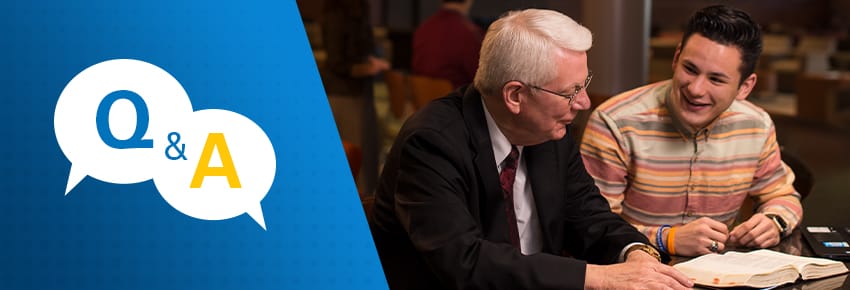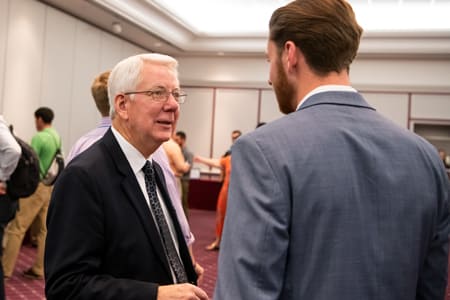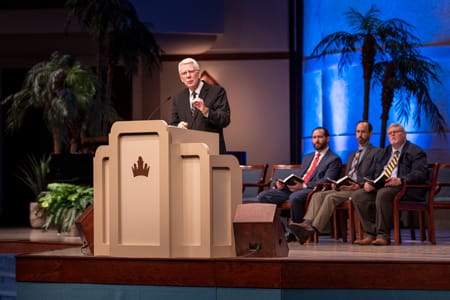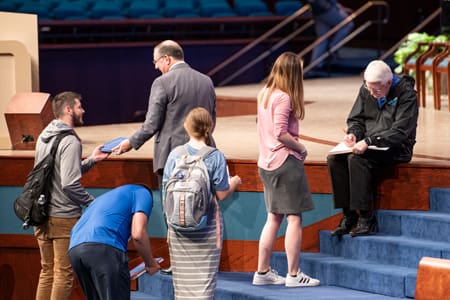
Affectionately known as the on-campus grandpa, Dr. Dale Adkins is the local church ministries coordinator and provides biblical guidance for student men. As a new college graduate in 1973, Dr. Adkins began pastoring in his home state of Kentucky. After ministering there for 13 years, he and his wife Carol Adkins were called to lead a church in Mansfield, Ohio. They retired from a pastoral ministry in 2012 and joined the staff at Pensacola Christian College, where he’s been a guest chapel speaker since 1996.
1. What brought you to PCC?
Well, my sarcastic side would say a U-Haul truck. But actually, I came here the first time to preach in chapel. Every couple of years after that, they’d have me back. Dr. Arlin Horton used to kid with us, “When are you going to come join staff?” In 2012, after 27 years, we decided it was time for us to leave Mansfield, Ohio, to resign the church. In July, we came down and interviewed, they hired us, and we started in August. Dr. Troy Shoemaker told us that my wife and I were his first hire. I told him that he’d get better hires after that. But we were the first two people that he officially hired as president of the College. I had finished up what I believed to be my pastoral ministry, and I wasn’t ready to retire in the sense of retiring, so we were looking for another opportunity. In my lifetime, I had often thought that before I was done, I would like to be in an environment to work with young preachers. I never imagined that the Lord would open the door where I would have the opportunity not only to work with preachers but with young people in general.
2. What did you do before you began working here?
I’d been in the ministry for about 40 years before we came here. When I surrendered to preach, word got around quick that circuit rider Henry Jack Ridner’s grandson was a preacher. A church my grandfather had pastored years ago in Kentucky called me and asked me to come preach at a revival meeting. And so I went and preached, and on the last night of the revival meeting, the pastor of the church got up and resigned. He had this plan. He’d already accepted a church up in Ohio. This was November. It was May before I actually went up there to pastor. And I really don’t think to this day they knew how young I was. But I’ve always had a little white in my hair, even in my early 20s. So right after I graduated from college in 1973, I became the pastor there in Somerset, Kentucky. I was 22 years old. We were there for almost 13 years when we left there and went to Mansfield, Ohio.
3. What are your roles here at PCC and your responsibilities?
I’m what they call the local church ministry coordinator. I work with the ministerial guys that are doing internships out of the churches, and I act as the liaison between the churches and the College, making sure the guys there are doing their job. And if there’s any problems or anything, I deal with that. I’m also what Dr. Shoemaker has referred to as “the chapel guy.” That’s the official title. I emcee and oversee all the chapel services, which includes contacting the speakers. I don’t pick out the speakers myself, but I contact them, set up the dates, and make the arrangements for them to come, and that sort of thing. And I work with the men students giving biblical counsel.
4. How have you enjoyed serving and encouraging young people at a Christian college?

I enjoy it! Just to see the enthusiasm and to see the potential that is in a place like this—it’s exciting to me. It’s kind of discouraging when you look around the country right now, and even some churches that you visit. But to see a group of young people like this . . . By and large, the majority of young people around here want to do right or are trying to figure out what right is and trying to figure out “What direction am I going to go in?” But at the same time, they’re enthusiastic about serving the Lord. Somebody asked me one time if being here kept me feeling young. And I said, absolutely not! It’s a constant reminder of how old I am because we don’t speak the same as far as the things that I talk about. The things that are history to them are things I remember. But being here is just an encouragement for me. And I hope that I can be an encouragement to students and see what all God’s doing with this place.
5. Tell me about your own college experience. How has your training helped you with the roles you’ve held throughout your life?
When I graduated, there was no PCC. I graduated from college in 1972, and the College didn’t start till ’74 I believe. I went to a small Christian college in Chattanooga, Tennessee. At that time, the main emphasis was on preparing guys for the ministry. I had some great teachers, and I had a lot of practical experience while I was there. For a short period of time, I pastored a chapel at Highland Park that had sponsored the college. I was only there for probably six months. And it was, I’m talking, small. We had 25 on a Sunday morning, and I was ready to write to Sword of the Lord and tell them we had the fastest growing church in the Whitwell, Tennessee, area. Our normal attendance was like eight, nine, or ten. We worked with the chapel a lot because my wife could play the piano. And everybody wanted a piano player. Nobody wanted me, but they wanted her because she could play the piano. But my wife and I drove up there on Sunday mornings, we would have Sunday school and the morning service, and then stay there all afternoon for the service that night and then drive back to school. It prepared me academically, and I had the opportunity to exercise what I’d learned in the classroom practically.
6. Your wife, Carol Adkins, works in the Rebekah Horton Library. What is it like to work in the same ministry together?
She’s retiring soon, but it’s been good. When I was pastoring, she taught in the school there in Mansfield. So we were kind of together, but not really because she was in the school, and I was leading the church. We didn’t eat lunch together and all that sort of thing. Since we’ve been here, we eat lunch together every day. We work in different areas, so when we go home at night, what she wants to talk about in relation to where she works is totally removed from what I’m doing. And the same thing for me. And I’ll miss that when she’s no longer working. What’s been odd is that in church for 40 years, she sat by herself, sometimes with our kids when they were small, and I was up in the front preaching. Now, she’s up in the choir, and I’m out there sitting by myself. It’s been a kind of role reversal. One day, we’ll work it out where we get to sit together, but that’s been funny.

7. In chapel and Campus Church services, you often reflect on your time pastoring in Mansfield, Ohio. How has your experience there informed your interactions with the students and staff of PCC?
Well, when I was in Ohio, all my illustrations came from Kentucky. And when I left Ohio and came here, my illustrations came from Ohio. But it’s all just a matter of working with people—whether you’re pastoring a church or whether you’re working with a bunch of kids or young adults. Someone made the comment one time that the same people go to every church, but they have different faces and different names. Once you learn how to deal with people, then it applies wherever you’re at.
8. During a fall semester chapel service in 2017, Pastor Matt Teis created the Dr. Radkins character, a “cooler” version of yourself. You’ve since been featured as the character in skits and videos during Student Body Meetings. What have you thought about how students appreciate your going along with the joke?
I learned a long time ago that if you don’t make fun of yourself, somebody’s going to make fun of you. It doesn’t bother me. I don’t mind that a bit—I mean, even bantering around with Josh Burdick (Pastoral Ministries ’00, M.A. Bible Exposition ’02) and the other Campus Church staff. If it can help some students to relate a little better, if we can help some to relax or feel that things aren’t so starchy around here and feel more at home, that doesn’t bother me. And Pastor Matt Teis (Pastoral Ministries ’00)—I get myself in trouble when someone says, “Hey, could you help me out with something?” And I say, “Sure!” without asking any questions ahead of time, and then I find myself in the middle of those things, but I don’t mind.
9. Can you share an example of how students have shown their appreciation for you over the years?

There have been so many times that they’ve been so gracious. Last year at one of the ball games, the students were supposed to make posters. And a student made a poster that said, “We love you Dr. Adkins,” and a bunch of them put their names on it. There’s nothing like those that walk up and speak to me. I like that, and I hope I don’t give off the appearance that I’m not approachable. And I get letters and a lot of prayer group requests. And we enjoy it when we run into students away from here. We were out in Williams, Arizona, this summer. We took the train up to the Grand Canyon, and we’re standing there in the little shop. There were some kids from the College that came up to us. They recognize my wife and myself, and that to me is just really a joy. Honestly, a lot of times I don’t recognize them, but I really enjoy when they come up to speak and tell me about themselves and other students.
10. What advice would you give to incoming students?
I always try to encourage incoming students to try to take advantage of everything at PCC because all those things go together to develop you as a mature adult. I’m talking not only from the academic side but your collegian. Get involved when you can with the things that are going on. If you’re not athletic, that’s fine. Get involved with a service project or go to a Christian Service. I’m a big proponent of things like Fine Arts. I know some don’t care for them, and that’s fine, but you never know what can be an opportunity to stretch yourself and do something that you would not normally do. When I went to college, we actually had to take a class on etiquette. I’m just a kid from Kentucky, and the last thing in the world I’m thinking about is why I would need to know which fork to use in a big banquet. Well, after I’d been pastoring in Ohio for just a few years, we were invited to Washington, D.C., for this big conference, and it’s a banquet. And we sit down at this table, and I’m looking at all these forks, and I find that I know what to do in these circumstances. And so, you never know the opportunities that God’s going to give you. So again, just take advantage of everything, every opportunity. It’ll grow you, and it’ll develop you.
This interview has been edited for length and clarity.
